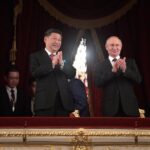
Russian President Vladimir Putin is doing in days what decades of American prodding and pressure couldn’t: Getting Germany and other European nations to unite, expand defense spending and strategic thinking, and do more to protect themselves and others.
Why it matters: Putin calculated a divided America and Europe would make it hard to punish him for invading Ukraine. Instead, he’s spawned a new coalition of the willing that spreads from Europe, to U.S. companies, to Russians in the streets.
Stay on top of the latest market trends and economic insights with Axios Markets. Subscribe for free
The latest: Putin today ordered Russian nuclear deterrent forces to high alert, citing sanctions and “aggressive statements” by Western countries, AP reports.
-
Putin said in televised comments: “Western countries aren’t only taking unfriendly actions against our country in the economic sphere, but top officials from leading NATO members made aggressive statements regarding our country.”
Ukraine President Volodymyr Zelensky said today that a Ukrainian delegation would meet with a Russian delegation “without preconditions” on the Ukrainian-Belarusian border.”
-
Zelensky said on Telegram following a conversation with Belarusian President Alexander Lukashenko: “Lukashenko has taken responsibility for ensuring that all planes, helicopters and missiles stationed on Belarusian territory remain on the ground during the Ukrainian delegation’s travel, talks and return.”
The U.S. ambassador to the U.N., Ambassador Linda Thomas-Greenfield hinted today on CNN’s “State of the Union” that Russia could face accusations of war crimes at The Hague. (Watch the video.)
Zoom out: Under public pressure from Ukrainian President Volodymyr Zelensky, European countries one by one dropped their objections to limiting Russia’s access to the SWIFT financial transactions system. The U.S. joined yesterday.
Zoom in: The U.S. has been pushing Germany for years to spend 2% of its GDP on defense to no avail. But in a speech today, Chancellor Olaf Scholz said there was now a “new reality.”
-
“The 24th February marks a turning-point in the history of our continent,” Scholz said, pointing to Thursday’s invasion.
Not only will Germany hit the 2% threshold, Scholz proposed enshrining that commitment in the constitution.
The bottom line: Close observers of German politics said they’ve never seen so many doctrines of German foreign policy dismantled so quickly.
Go deeper: Axios Ukraine dashboard
Like this article? Get more from Axios and subscribe to Axios Markets for free.




